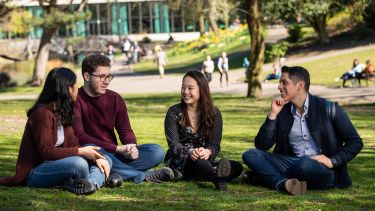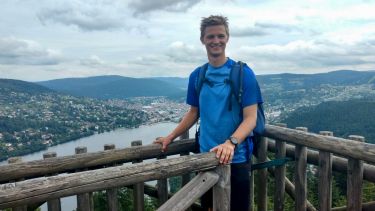I feel like I am playing a small yet important part in tackling the climate emergency

Where do you currently work and what does your role involve?
I currently work at Hope for the Future, a national climate charity that works to equip communities, groups and individuals across the country to communicate the urgency of climate change with their elected representatives. The main part of my role as a Constituency Support Officer is to act as the main point of contact for constituents to engage their elected representatives, helping them to do everything from writing a letter to their local councillor to organising a community event with their MP. I am also working on an exciting project that aims to encourage more people from underrepresented groups to take action on the climate emergency.
What is the most exciting element of your job?
Nothing beats the satisfaction and pride of taking a constituent from a point where they have multiple letters ignored by their MP to a stage where they have a relationship strong enough to achieve big 'asks', such as holding a debate in Parliament or asking a question in a debate. It is certainly rewarding to watch a House of Commons debate and see an MP ask a question that you devised to a Minister, especially if something changes because of it! It really makes me feel like I am playing a small yet important part in tackling the climate emergency in conjunction with many others worldwide.
Why did you choose to study International Development at the University of Sheffield?
Having already studied my undergraduate degree in the School of Geography and Planning (BA Geography), I knew the staff were friendly, dedicated and world-leading specialists in their relevant fields, and honestly could not see myself going anywhere else! I really liked the emphasis the course put on learning about social and environmental justice in the context of international development, in addition to the unique placement-based dissertation, which gave me a chance to work with a partner organisation in the Philippines to investigate the impact COVID-19 had upon informal settlements in Metro Manila.
What has your career path been since graduation?
I applied for my current role during the final months of the course and started only a few days after handing in my dissertation! I believe that the extracurricular activities I did during my Masters, such as getting involved with the Students Union council and SIDShare (a student-led NGO) played a huge part in showing I had the relevant experience and skillset to be effective at the role, despite me not working in the sector previously full time.
What key skills did you develop on the course that you use in your career?
One of the most important skills I use everyday is teamwork. Everything we do has a strong element of collaboration, whether that be working together to complete an MP profile or planning a local community event - liaising with each other in a clear and concise way is essential to achieving our aims. There were multiple opportunities to develop this on the course, such as through group projects, the field class, and seminars, which not only improved my ability to work with others, but also helped me to become more confident and contribute more towards projects. In addition, some of my modules required me to produce a policy brief as part of the assessment, and being able to develop the art of communicating complex issues in a concise manner to non-academic audiences is a really important skill in so many careers.
Which aspects of the course did you particularly enjoy?
I really enjoyed the virtual field class to Nepal, which gave me a fantastic opportunity to speak directly with rural communities to uncover development challenges in the context of climate change, and suggest improvements that could be made by the Government. It really made me feel like I was already working in a relevant career, which made the assessment a lot easier to undertake! I also found the module 'The Science of Environmental Change' extremely interesting as I was able to learn about the reasons behind historical and recent environmental change, which has made it much easier to talk about things like global warming to audiences that find it complicated.
What advice would you give people considering doing a masters in International Development?
My main piece of advice would be to get stuck in with as much extracurricular stuff as you can. There are multiple opportunities to get involved with talks, seminars, career experiences, placements and trips abroad (to name a few), so always check your emails regularly. Having an International Development masters from Sheffield will already be a fantastic thing to have on your CV, but to really stand out I think it is really important to be able to talk about all the extra things you did during your time on the course. There is also a fantastic Students Union with hundreds of different societies available to cater to quite simply every interest - if you are even slightly interested, go and give it a go, it is very unlikely you will regret it.

International postgraduate taught scholarships
We're offering scholarships worth up to £3,000 to international students joining the University to study a taught masters programme in September 2026.

